| Listing 1 - 10 of 20 | << page >> |
Sort by
|
Book
ISBN: 022649635X Year: 2017 Publisher: Chicago, Illinois ; London : The University of Chicago Press,
Abstract | Keywords | Export | Availability | Bookmark
 Loading...
Loading...Choose an application
- Reference Manager
- EndNote
- RefWorks (Direct export to RefWorks)
Hip hop has long been a vehicle for protest in the United States, used by its primarily African American creators to address issues of prejudice, repression, and exclusion. But the music is now a worldwide phenomenon, and outside the United States it has been taken up by those facing similar struggles. Flip the Script offers a close look at the role of hip hop in Europe, where it has become a politically powerful and commercially successful form of expression for the children and grandchildren of immigrants from former colonies. Through analysis of recorded music and other media, as well as interviews and fieldwork with hip hop communities, J. Griffith Rollefson shows how this music created by black Americans is deployed by Senegalese Parisians, Turkish Berliners, and South Asian Londoners to both differentiate themselves from and relate themselves to the dominant culture. By listening closely to the ways these postcolonial citizens in Europe express their solidarity with African Americans through music, Rollefson shows, we can literally hear the hybrid realities of a global double consciousness.
Hip-hop --- Postcolonialism and music. --- Music --- African American influences. --- Europe. --- black Atlantic. --- culture industry. --- double consciousness. --- global hip hop. --- immigration. --- music. --- popular music. --- postcolonialism. --- race.
Book
ISBN: 0367325403 0429901550 0429476787 1782412719 9781782412717 1322088578 9781322088570 9781782201342 0429915780 Year: 2014
Abstract | Keywords | Export | Availability | Bookmark
 Loading...
Loading...Choose an application
- Reference Manager
- EndNote
- RefWorks (Direct export to RefWorks)
This book is the product of a Campaign Day which was organised to raise awareness of Dissociative Identity Disorder (''DID''). The Paracelsus Trust undertook to bring people together, and individuals were enabled to tell their story to the audience. As this had been a profoundly moving experience, it was decided to put the presentations into a book and hence this publication. The book recounts some painful personal experiences and some ideas for ways forward, always recognising the pain of the condition and the abuse that precedes it.The Paracelsus Trust is a Charity which exists to support pe
Multiple personality --- Alternating personality --- Consciousness, Multiple --- DID (Personality disorder) --- Dissociated personality --- Dissociative identity disorder --- Double consciousness --- Double personality --- Dual personality --- MPD (Personality disorder) --- Multiple consciousness --- Multiple identity disorder --- Multiple personalities --- Multiple personality disorder --- Personality, Multiple --- Split personality --- Dissociative disorders --- Treatment.
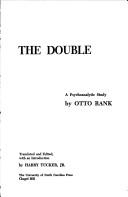
ISBN: 9781469610214 1469610213 0807897981 9780807897980 0807811556 9780807811559 9798890876041 Year: 1971 Publisher: Chapel Hill : University of North Carolina Press,
Abstract | Keywords | Export | Availability | Bookmark
 Loading...
Loading...Choose an application
- Reference Manager
- EndNote
- RefWorks (Direct export to RefWorks)
Alive, fresh, and stimulating, the theme of The Double comprises the issues of identity, narcissism, and the fear of death--actually the core of human existence. Rank's book is primarily a study of the double as it appeared in striking examples in German, French, Russian, English, and American literature from Goethe to Oscar Wilde.
Multiple personality. --- Alternating personality --- Consciousness, Multiple --- DID (Personality disorder) --- Dissociated personality --- Dissociative identity disorder --- Double consciousness --- Double personality --- Dual personality --- MPD (Personality disorder) --- Multiple consciousness --- Multiple identity disorder --- Multiple personalities --- Multiple personality disorder --- Personality, Multiple --- Split personality --- Dissociative disorders
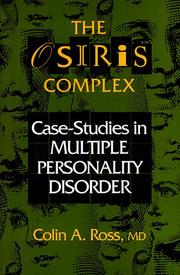
ISBN: 1282045466 9786612045462 1442681977 9781442681972 0802028586 0802073581 9780802073587 9780802028587 9781282045460 Year: 2000 Publisher: Toronto
Abstract | Keywords | Export | Availability | Bookmark
 Loading...
Loading...Choose an application
- Reference Manager
- EndNote
- RefWorks (Direct export to RefWorks)
The purpose of this book is to provide understanding of the relationship between childhood trauma and serious mental illness. Dr Colin Ross, one of the most respected North American authorities on Multiple Personality Disorder, writes that his MPD patients have taught him that virtually all psychiatric symptoms are potentially trauma driven and dissociative in nature. He believes that MPD research will shift the paradigm of psychopathology in the direction of a general trauma model, and away from the two dominant schools of twentieth-century psychiatry, the psychoanalytical and the biomedical. The Osiris Complex is a collection of case histories illustrating the clinical roots of the paradigm transformation Dr Ross anticipates. Contrary to prevalent opinion, MPD patients do not have more than one personality; the so-called different personalities are fragmented components of a single personality, abnormally personified and dissociated from each other. Adult patients exhibit core symptoms: voices in the head and ongoing blank spells or periods of missing time. The voices are the different parts of the personality talking to one another and to the main, presenting part of the person who comes for treatment. Periods of missing time occur when aspects of the personality take turns being in control of the body and memory barriers are erected between them. Patients also experience symptoms such as depression, anxiety, eating disorders, substance abuse, sleep disorders, sexual dysfunction, psychosomatic symptoms, and symptoms that mimic schizophrenia. MPD patients have experienced the most extreme childhood trauma of any diagnostic group and therefore exhibit the psychobiology and psychopathology of trauma to an extreme degree. The good news is that once diagnosed, the MPD patient can be brought back to health. This book is important for all mental health professionals, and also for the general reader interested in psychiatric phenomena. It will play a powerful role in the social revolution necessary for the recognition of the preponderance, intensity, and hiddenness of severe childhood emotional, physical, and sexual abuse in our culture.
Multiple personality. --- Multiple personality --- Alternating personality --- Consciousness, Multiple --- DID (Personality disorder) --- Dissociated personality --- Dissociative identity disorder --- Double consciousness --- Double personality --- Dual personality --- MPD (Personality disorder) --- Multiple consciousness --- Multiple identity disorder --- Multiple personalities --- Multiple personality disorder --- Personality, Multiple --- Split personality --- Dissociative disorders --- Case studies
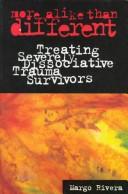
ISBN: 1442664843 9781442664845 0802004504 9780802004505 0802072380 9780802072382 Year: 1997 Publisher: Toronto
Abstract | Keywords | Export | Availability | Bookmark
 Loading...
Loading...Choose an application
- Reference Manager
- EndNote
- RefWorks (Direct export to RefWorks)
Just as the prevalence of incest and child sexual abuse was a well-kept secret until recently, the phenomenon of multiple personality disorder (MPD) - recently re-labelled dissociative identity disorder [DID] - has been minimized. In her practice as a psychologist, Margo Rivera has found this to be no coincidence. Confirming that the root of most severe dissociative conditions lies in severe trauma, most commonly child abuse, Rivera first discusses the general historical and social contexts of dissociation and proceeds through clinical theory, case vignettes, and recorded personal experience to provide practical guidance to assessment and treatment. Rivera covers such topics as 'therapeutic frame, ' 'transference and countertransference, ' and how to understand and make use of these concepts. She discusses the controversies around 'False Memory Syndrome' and ritual abuse, issues which currently divide professionals treating trauma survivors. Rivera makes a unique contribution to the treatment of lesbian and gay abuse survivors. She theorizes that all sexuality is a social construct, subject to change over an individual's lifetime, a reality that is nowhere more clear than in those with MPD who may experience themselves as alternately heterosexual female, homosexual male, lesbian, and heterosexual male. Insightful and provocative, this important therapeutic guide will be of interest to professionals who treat trauma survivors as well as to their clients.
Multiple personality --- Alternating personality --- Consciousness, Multiple --- DID (Personality disorder) --- Dissociated personality --- Dissociative identity disorder --- Double consciousness --- Double personality --- Dual personality --- MPD (Personality disorder) --- Multiple consciousness --- Multiple identity disorder --- Multiple personalities --- Multiple personality disorder --- Personality, Multiple --- Split personality --- Dissociative disorders --- Treatment. --- Psychoanalyse --- Klinische beschouwingen.
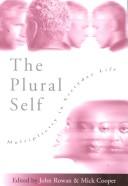
Abstract | Keywords | Export | Availability | Bookmark
 Loading...
Loading...Choose an application
- Reference Manager
- EndNote
- RefWorks (Direct export to RefWorks)
Sociology of culture --- Multiple personality. --- Personality. --- Persoonlijkheidspsychologie --- handboeken en inleidingen --- handboeken en inleidingen. --- Handboeken en inleidingen. --- Multiple personality --- Personality --- Personal identity --- Personality psychology --- Personality theory --- Personality traits --- Personology --- Traits, Personality --- Psychology --- Individuality --- Persons --- Self --- Temperament --- Alternating personality --- Consciousness, Multiple --- DID (Personality disorder) --- Dissociated personality --- Dissociative identity disorder --- Double consciousness --- Double personality --- Dual personality --- MPD (Personality disorder) --- Multiple consciousness --- Multiple identity disorder --- Multiple personalities --- Multiple personality disorder --- Personality, Multiple --- Split personality --- Dissociative disorders
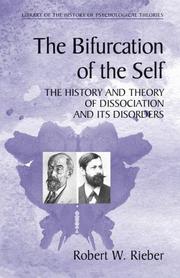
ISBN: 1280613653 9786610613656 0387274146 0387274138 Year: 2006 Publisher: New York : Springer,
Abstract | Keywords | Export | Availability | Bookmark
 Loading...
Loading...Choose an application
- Reference Manager
- EndNote
- RefWorks (Direct export to RefWorks)
For more than a hundred years, dissociative states, sometimes referred to as multiple personality disorder, have fascinated the public as well as scientists. The precise nature of this disorder is a controversial one, dividing clinicians, theorists, and researchers. Challenging the conventional wisdom on all sides, Robert Rieber’s Bifurcation of the Self traces the clinical and social history of dissociation in a provocative examination of this widely debated phenomenon. At the core of this history is a trio of related evolutions—hypnosis, concepts of identity, and dissociation—beginning with nineteenth-century "hysterics" and culminating in the modern boom in Dissociative Identity Disorder (DID) diagnoses and the parallel rise in childhood abuse/repressed memory cases. Rieber does not argue the non-existence of DID; rather he asserts that it is a rare disorder exaggerated by dissociation advocates and exploited by the media. In doing so, he takes on some of the most difficult questions in the field: How crucial is memory to a person’s identity? Can two or more autonomous personalities actually exist in the same body? If trauma causes dissociation, why aren’t there more DID cases? Why are DID cases prevalent in some eras but not in others? Does dissociative disorder belong in the DSM? The book is rigorously illustrated with two centuries’ worth of famous cases including Christine Beauchamp, Ansel Bourne, Eve Black/Eve White, and most notably the woman known as "Sybil", whose story is covered in depth with newly revealed manuscripts. And Rieber reviews the current state of DID-related controversy, from the professionals who feel that the condition is underreported to those who consider it a form of malingering, so that readers may draw their own conclusions.
Multiple personality --- Dissociative disorders --- Hypnotism. --- History. --- Schreiber, Flora Rheta. --- Wilbur, C. B. --- Dorsett, Sybil. --- Autosuggestion --- Braidism --- Hypnosis --- Trance --- Animal magnetism --- Mesmerism --- DDs (Psychology) --- Disorders, Dissociative --- Dissociation (Psychology) --- Psychology, Pathological --- Alternating personality --- Consciousness, Multiple --- DID (Personality disorder) --- Dissociated personality --- Dissociative identity disorder --- Double consciousness --- Double personality --- Dual personality --- MPD (Personality disorder) --- Multiple consciousness --- Multiple identity disorder --- Multiple personalities --- Multiple personality disorder --- Personality, Multiple --- Split personality --- Wilbur, Cornelia B.
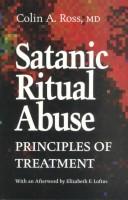
ISBN: 0802073573 0802028578 Year: 1995 Publisher: Toronto ; Buffalo ; London University of Toronto Press
Abstract | Keywords | Export | Availability | Bookmark
 Loading...
Loading...Choose an application
- Reference Manager
- EndNote
- RefWorks (Direct export to RefWorks)
Multiple personality --- -Ritual abuse victims --- -Satanism --- -Black Mass --- Devil-worship --- Satanic cults --- Worship of Satan --- Cults --- Occultism --- Victims of ritual abuse --- Victims of crimes --- Alternating personality --- Consciousness, Multiple --- DID (Personality disorder) --- Dissociated personality --- Dissociative identity disorder --- Double consciousness --- Double personality --- Dual personality --- MPD (Personality disorder) --- Multiple consciousness --- Multiple identity disorder --- Multiple personalities --- Multiple personality disorder --- Personality, Multiple --- Split personality --- Dissociative disorders --- Treatment --- Rehabilitation --- Rituals --- Ritual abuse victims --- Satanism --- Treatment. --- Rehabilitation. --- Rituals. --- -Treatment --- Ritual --- Ritual abuse
Book
ISBN: 147984229X 9781479842292 Year: 2020 Publisher: New York, NY
Abstract | Keywords | Export | Availability | Bookmark
 Loading...
Loading...Choose an application
- Reference Manager
- EndNote
- RefWorks (Direct export to RefWorks)
"The Sociology of W.E.B. Du Bois" explores racism and colonialism at the center of the understanding of modernity"--.
Du Bois, William E. B. --- USA --- Agency. --- Chance. --- Colonial commodity. --- Coloniality. --- Contextuality. --- Contrast. --- Cooperative economy. --- Du Boisian Sociology. --- Global veil. --- Heterogeneity. --- Historicity. --- History. --- Induction. --- Intersectionality. --- Pragmatism. --- Propaganda. --- Public Sociology. --- Racial and colonial capitalism. --- Relationality. --- Scholar activist. --- Science and activism. --- Second sight. --- Socialism. --- Solidarity. --- Standpoint. --- The racial state. --- The social study. --- The talented tenth. --- The veil. --- Twoness. --- Whiteness. --- double consciousness. --- global color line. --- law and chance. --- panafricanism. --- racialized modernity. --- racialized subjectivity. --- the black radical tradition. --- the color line.
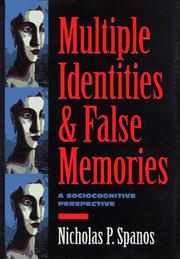
ISBN: 1557983402 Year: 1996 Publisher: Washington (D.C.): American psychological association
Abstract | Keywords | Export | Availability | Bookmark
 Loading...
Loading...Choose an application
- Reference Manager
- EndNote
- RefWorks (Direct export to RefWorks)
False memory syndrome --- Multiple personality --- Alternating personality --- Consciousness, Multiple --- DID (Personality disorder) --- Dissociated personality --- Dissociative identity disorder --- Double consciousness --- Double personality --- Dual personality --- MPD (Personality disorder) --- Multiple consciousness --- Multiple identity disorder --- Multiple personalities --- Multiple personality disorder --- Personality, Multiple --- Split personality --- Dissociative disorders --- False memories --- Memories, False --- Memory, False --- Iatrogenic diseases --- Psychiatric errors --- Syndromes --- Recovered memory --- False memory syndrome. --- Multiple Personality. --- Persoonlijkheidspsychologie --- persoonlijkheidsstoornissen --- persoonlijkheidsstoornissen. --- Persoonlijkheidsstoornissen. --- Multiple Personality --- Hypnosis --- Repression, Psychology --- Dissociative Identity Disorder --- Mind-Body Therapies --- Psychotherapy --- Defense Mechanisms --- Dissociative Disorders --- Mental Disorders --- Behavioral Disciplines and Activities --- Complementary Therapies --- Behavior and Behavior Mechanisms --- Therapeutics --- Psychiatry and Psychology --- Analytical, Diagnostic and Therapeutic Techniques and Equipment --- Psychiatry - General --- Psychiatry --- Health & Biological Sciences
| Listing 1 - 10 of 20 | << page >> |
Sort by
|

 Search
Search Feedback
Feedback About UniCat
About UniCat  Help
Help News
News